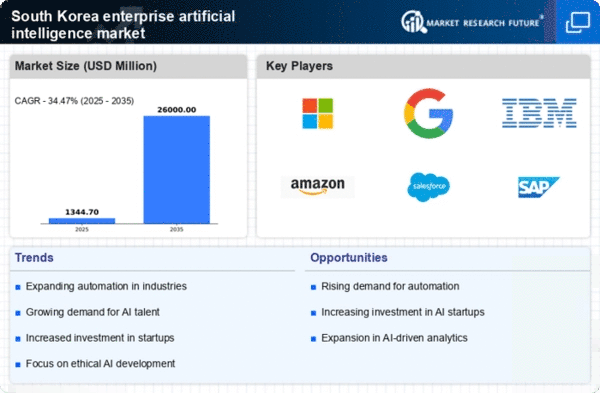Rising Demand for Automation
the enterprise artificial intelligence market in South Korea is experiencing a notable surge in demand for automation solutions. Businesses are increasingly adopting AI technologies to streamline operations, enhance productivity, and reduce operational costs. According to recent data, the automation sector is projected to grow by approximately 15% annually, driven by the need for efficiency in various industries. This trend indicates a shift towards integrating AI into core business processes, allowing organizations to leverage data-driven insights for decision-making. As companies seek to remain competitive, the adoption of AI-driven automation tools becomes essential, thereby propelling the growth of the enterprise artificial-intelligence market. Furthermore, the South Korean government supports this transition through initiatives aimed at fostering innovation and technological advancement, which further stimulates market expansion.
Growing Focus on Data Security
Data security concerns are increasingly influencing the enterprise artificial-intelligence market in South Korea. As organizations adopt AI technologies, the need to protect sensitive information becomes paramount. Recent studies indicate that nearly 70% of businesses prioritize data security when implementing AI solutions. This focus on safeguarding data is driving the development of advanced security protocols and AI-driven cybersecurity measures. Consequently, the enterprise artificial-intelligence market is witnessing a rise in demand for solutions that not only enhance operational efficiency but also ensure robust data protection. As regulatory frameworks evolve to address these concerns, companies are likely to invest more in secure AI technologies, further propelling market growth. This emphasis on data security is essential for building trust and ensuring the sustainable adoption of AI across various sectors.
Advancements in Machine Learning
Technological advancements in machine learning are significantly influencing the enterprise artificial-intelligence market in South Korea. The rapid evolution of algorithms and computational power enables businesses to harness vast amounts of data for predictive analytics and decision-making. Recent statistics suggest that the machine learning segment is expected to account for over 40% of the total AI market by 2026. This growth is indicative of the increasing reliance on data-driven strategies across various sectors, including finance, healthcare, and manufacturing. As organizations recognize the potential of machine learning to enhance customer experiences and optimize operations, investments in this area are likely to escalate. Consequently, the enterprise artificial-intelligence market is poised for substantial growth, driven by the continuous innovation in machine learning technologies.
Government Initiatives and Support
Government initiatives play a crucial role in shaping the enterprise artificial-intelligence market in South Korea. The South Korean government has implemented various policies aimed at promoting AI research and development, which fosters a conducive environment for innovation. For instance, funding programs and tax incentives for AI startups are designed to stimulate growth in this sector. Recent reports indicate that government investment in AI technologies is expected to reach approximately $2 billion by 2027, reflecting a commitment to establishing South Korea as a leader in AI. This support not only encourages private sector investment but also enhances collaboration between academia and industry, thereby driving advancements in the enterprise artificial-intelligence market. As a result, the market is likely to witness accelerated growth fueled by these strategic initiatives.
Integration of AI in Business Strategies
The integration of artificial intelligence into business strategies is becoming increasingly prevalent in South Korea. Companies are recognizing the necessity of incorporating AI technologies to remain competitive in a rapidly evolving market landscape. This trend is evidenced by a survey indicating that over 60% of South Korean enterprises plan to implement AI solutions within the next two years. The enterprise artificial-intelligence market is thus experiencing a paradigm shift, as organizations leverage AI for enhanced customer engagement, operational efficiency, and data analysis. This strategic alignment with AI capabilities not only improves business outcomes but also positions companies to adapt to changing consumer demands. As such, the market is likely to expand as more businesses embrace AI as a core component of their strategic initiatives.
















